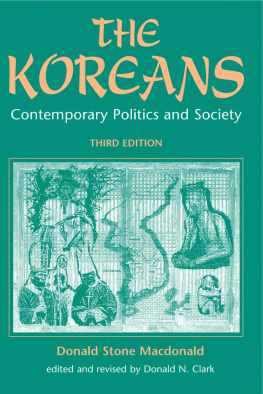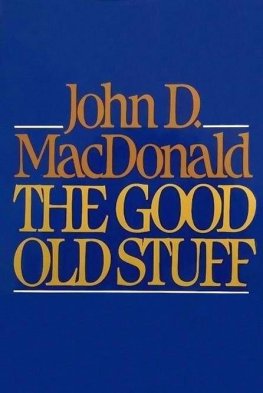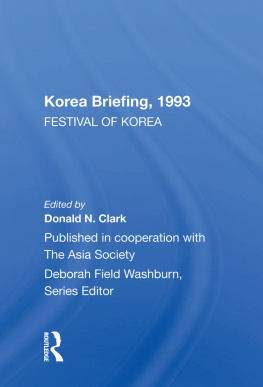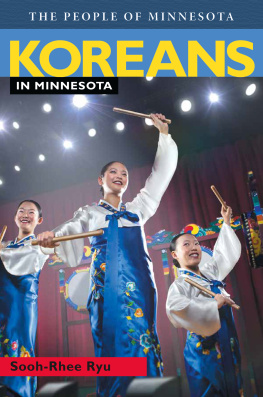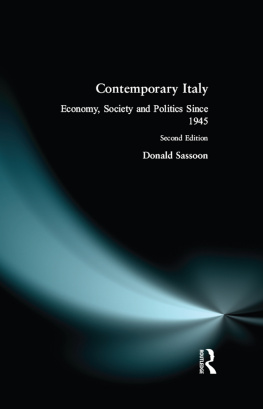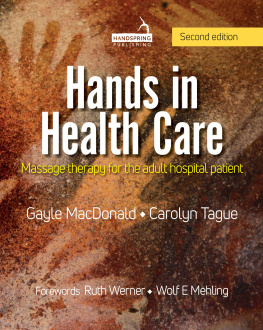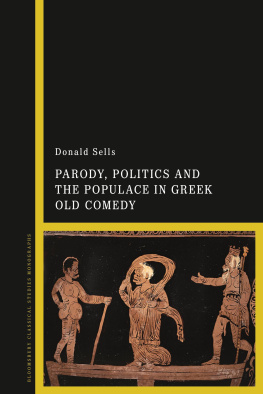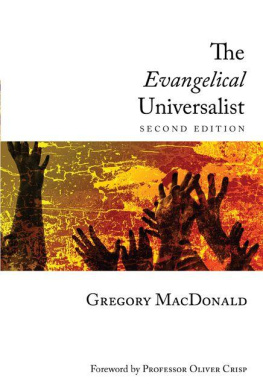The Koreans
Contemporary Politics and Society
Third Edition
Donald Stone Macdonald
Edited and Revised by
Donald N. Clark
Trinity University
Frontispiece: Satellite view of the Korean Peninsula (photo courtesy of Korea Overseas Information Service)
First published 1996 by Westview Press
Published 2018 by Routledge
711 Third Avenue, New York, NY 10017, USA
2 Park Square, Milton Park, Abingdon, Oxon OX14 4RN
Routledge is an imprint of the Taylor & Francis Group, an informa business
Copyright 1996 Taylor & Francis
All rights reserved. No part of this book may be reprinted or reproduced or utilised in any form or by any electronic, mechanical, or other means, now known or hereafter invented, including photocopying and recording, or in any information storage or retrieval system, without permission in writing from the publishers.
Notice:
Product or corporate names may be trademarks or registered trademarks, and are used only for identification and explanation without intent to infringe.
Library of Congress Cataloging-in-Publication Data
Macdonald, Donald Stone.
The Koreans: contemporary politics and society / by Donald Stone
Macdonald; revised and edited by Donald N. Clark.3rd. ed.
p. cm.
ISBN 0-8133-2888-8 (pb)
1. KoreaHistory. 2. Korea (South)Politics and government.
3. Korea (North)Politics and government. 4. Korean reunification
question (1945- ) I. Clark, Donald N. II. Title.
DS907.18.M33 1996
951.9'04dc20
96-13297
CIP
ISBN 13: 978-0-8133-2888-1 (pbk)
Donald Stone Macdonald's survey of modern Korea has been a mainstay of Korean studies courses in the West since it was first published in 1988. Written from the point of view of a senior American scholar-official, it reflects both his experience as a Foreign Service officer and government Korea specialist and his disciplinary training as a political scientist. The book is based on a truly distinguished career. Macdonald first saw Korea as a young army officer with the U.S. military occupation forces in 1946. He was on the scene as a third secretary in the American Embassy when the Korean War broke out in 1950. As Korea desk officer in the State Department in 1960-1961 he had a front-row seat for the transition from the Rhee regime to Park Chung-hee's military rule. Later he contributed to U.S. Korea policy in positions in Washington and Seoul. After retirement from government service he earned his Ph.D. in political science at George Washington University with a dissertation on the military government period. He taught at East Stroudsburg State College in Pennsylvania and then at Georgetown University, where he was Research Professor of Korean Studies and one of the founders of Georgetown's Korean studies program. Throughout all those years he dedicated his energies and leadership to fostering better relations between the United States and Korea and won the respect and affection of fellow officials, academic colleagues, and students alike.
When Macdonald died in 1993 he was contemplating a third edition of The Koreans but had not yet begun work on it. He was familiar with the phenomenon of rapid change in Korea and recognized that there would have to be considerable revision of the manuscript to reflect the changes since the second edition in 1990. The preceding December, south Korea had elected its first civilian president since 1963. A year before that, north and south Korea had signed a series of agreements that seemed to promise progress on the perennial problem of reunification but were clouded by north Korea's apparent determination to develop nuclear weapons. North Korea and the international community barely averted a major confrontation in June 1993. At the time of his death a few weeks later Macdonald was persuaded more than ever that the West needed to take Korea seriously and study it systematically.
Donald Macdonald was an optimist about Korea. He was quick to praise the performance of the south Korean economyand he was tolerant of the stern military regimes that directed it. His career in Korean affairs had been shaped during the most violent phase of modern Korean history, and his experience with the devastation of the Korean War and the Herculean efforts that were required to reconstruct the country persuaded him that the ultimate foe was the danger of renewed warfare on the peninsula. Like most Korea specialists of his time, he never had a chance to visit north Korea and saw the Kim Il-sung government mainly as a threat. Yet he tried hard to understand north Korea on its own terms and not merely in terms of the Cold War. Had he lived, he surely would have played the role of senior adviser in the unfolding drama of gradual U.S. engagement with the north.
In taking charge of the project of revising Macdonald's third edition, I wanted to preserve Macdonald's voice and viewpoint on Korean affairs. However, I knew him well enough to believe that he would have seen the changes taking place in the early 1990s as an opportunity to adjust some of his earlier views. Like the Korean people themselves, he would have been shocked at the scale of corruption in the regimes of Chun Doo-hwan and Roh Tae-woo that was uncovered over the winter of 1995 and brought to light in the trials of 1996. He also would have been fascinated by north Korea as it practiced Kimilsungism without Kim Il-sung, struggling to deal with massive internal problems while pursuing engagement with the outside world on its own terms. He would have been more admiring than ever of south Korea's economic influence in the world and the revolutionary potential of telecommunications and open markets for Korean society. Revising The Koreans therefore meant revising Macdonald on these points, in addition to updating facts and figures throughout the volume. I believe the result is a volume that speaks a subtler language about the U.S. role in shaping contemporary Korea and that takes account of the political reckoning that Koreans are facing, both in "righting the wrongs of the past," as President Kim Young-sam has termed it, and in the ultimate goal of peaceful and mutually charitable reunification between the south and north.
Donald N. Clark
Among its foreign residents, Korea is known as "the best-kept secret" because living there is so much better than they had expected. This gap between expectation and reality is only one of many indications that the Westparticularly the United Statesdoes not know Korea. Such ignorance is grossly out of proportion to the real importance of Korea to the rest of the world. It also overlooks the fascinating history of the Korean people, who have preserved their own distinctive identity and culture despite hundreds of invasions over the centuries by their neighbors.
Since World War II, Korea has undergone a dramatic transformation from a sleepy and poverty-stricken nation of landlord-ridden peasants to become a vital, expanding modern economy. Tragically divided since 1945 by ideology, superpower rivalry, and civil war, both Koreas have nevertheless led the developing world in economic progress. In fierce competition with each other, the two Korean states have become major factors in the security, stability, and progress of East Asia.



